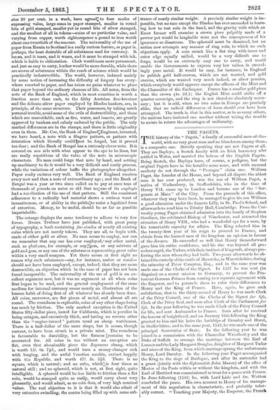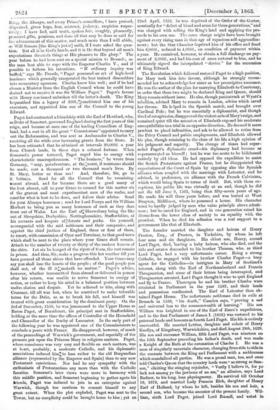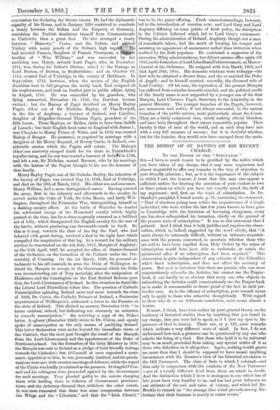THE PAGETS.
HE history of the " Pagets," a family of successful men-of-the-
world,, with no very great man and no blunderers among them, is a composite one. Strictly speaking they are not Pagets at all. They are Bayleys, a Scotch family with an Irish baronetcy who settled in Wales, and married the heiress of the English Pagets. Being Scotch, the Bayleys have, of course, a pedigree, but the original Pagets have in the heraldic sense none, and with unusual modesty do not through the " Peerages " claim one. William Paget, the founder of the House, and beyond all dispute the ablest man it has ever produced, was the son of William Paget, a native of Wednesbury, in Staffordshire, who in the time of Henry VII. came up to London and became one of the "Ser- geants at Mace" of the City. From the proceeds of this office, whatever they may have been, he managed to give his son William a good education under the famous Lilly, in St. Paul's School, and afterwards to send him to Trinity Hall, Cambridge. From the Uni- versity young Paget obtained admission into the family of Stephen Gardiner, the celebrated Bishop of Winchester, and attracted the attention of Henry VIII., who had a wonderful eye for a man, by his remarkable capacity for affairs. The King selected him in the twenty-first year of his reign to proceed to France, and obtain from the learned men of the kingdom an opinion in favour of the divorce. He succeeded so well that Henry thenceforward gave him his entire confidence, and his rise was beyond all pre- cedent rapid, the Tudors, with their instinct of kingcraft, always pre- ferring the men whom they had built. Two years afterwards he ob- tained thecustody of the castle of Maxstoke, in Warwickshire, during the minority of Peter Compton, Esq., and in the same year was made one of the Clerks of the Signet. In 1537 he was sent (in disguise) on a secret mission to Germany, to prevent the Pro- testant German Princes from coming to a separate agreement with the Emperor, and to persuade them to refer their differences to Henry and the King of France. Here, again, he gave such satisfaction, that in the thirty-second of Henry he was made Clerk of the Privy Council, one of the Clerks of the Signet for life, Clerk of the Privy Seal, and soon after Clerk of the Parliament for life. In the year following he was made Clerk of the Privy Council for life, and sent Ambassador to France. Soon after he received the honour of knighthood, and on January 16th following the Kiug granted to him and his heirs the lordships of Bromley and Hurst, in Staffordshire, and iu the same year, 1543, he was made one of the principal Secretaries of State. In the following year he was joined in a commission with the Chancellor Wriothesley and the Duke of Suffolk to arrange the marriage between the Earl of Lennox andthe Lady Margaret Dough's, daughter of Margaret Tudor and niece of the King, from which marriage sprang the unfortunate Henry, Lord Darnley. In the following year Paget accompanied the King to the siege of Boulogne, and after its surrender had a grant (jointly with the diplomatist John Mason) of the office of Master of the Posts within or without the kingdom, and with the Earl of Hertford was commissioned to treat for a peace with France. In June following (1546) he, with Lord Lisle and Dr. Wotton concluded the peace. His own account to Henry of his manage- ment of this negotiation is characteristic, and probably toler- ably correct. " Touching your Majesty, the Emperor, the French
King, the Almayn, and every Prince's councilors, I have praised, dispraised, given hope, fear, mistrust, jealousy, suspicion respec- tively ; I have lied, said truth, spoken fair, roughly, pleasantly, promised gifts, pensions, and done all that may be done or said for the advancement of this matter, and much more than I will abide, as Will Somers [the King's jester] saith, if I were asked the ques- tion. But all is in God's hands, and it is He that beyond all men's expectations directeth things at His pleasure to His glory." The year before he had been sent on a special mission to Brussels, as the man best able to cope with the Emperor Charles V., and if possible to fathom his intentions. " If ordinary inquiry was baffled," says Mr. Fronde, " Paget possessed an art of high-bred insolence which generally exasperated the best trained dissemblers into momentary openness. Charles knew him well ; and if he had chosen a Minister from the English Council whom he could have desired not to receive it was Sir William Paget." Paget's favour with Henry continued unbroken till the Letter's death. The King bequeathed him a legacy of 300/.,1constituted him one of his executors, and appointed him one of the Council to the young Edward.
Paget had contracted a friendship with the Earl of Hertford, who, as Duke of Somerset, governed England during the first years of this reign, and became at once one of the leading Councillors of Eng- land, had a seat in all the great " Commissions" appointed to carry out the Reformation, and was sent as Ambassador to Charles V., receiving all the while ever increasing grants from the State. It has been estimated that he obtained at intervals 20,0001. a year from Church lands, in those days a colossal fortune. When Somerset's power tottered, Paget urged him to energy with characteristic unscrupulousness. " The business," he wrote from Germany, " may, peradventure, at the:rovorst, if resistance should be made, cost a thousand or two thousand men's lives. By St. Mary, better so than mo ! And, therefore, Sir, go to 22nd April, 1552. he was deprived of the Order of the Garter, nominally for " defect of blood and arms for three generations," and was charged with selling the King's land and applying the pro- ceeds to his own use. The same charge might have been brought against every rising man in that age of rapacious self-aggrandize- ment; but the Star Chamber deprived him of his office and fined him 6,0001., reduced to 4,0001., on condition of payment within a year. He contrived, however, to obtain a full discharge on pay- ment of 2,0001., and had his coat of arms restored to him, and he ultimately signed the interpolated " device " for the succession of King Edward.
The Revolution which followed restored Paget to a high position, for Mary took him into favour, although he strongly recom- mended her to acknowledge her sister as her prescriptive successor. He was the author of the plan for marrying Elizabeth to Courtenay, in order that these two might be declared King and Queen, should Mary remainwithout issue. He also, though panicstrack at Wyatt's rebellion, advised Mary to remain in London, advice which saved her throne. He helped in the Spanish match, and brought over Cardinal Pole ; but he was essentially a diplomatist, and though tired of conspiracies, disapproved the violent acts of Mary's reign, and remained quiet till the accession of Elizabeth exposed his moderate susceptibilities to a trial in an opposite direction. He deemed it more prudent to plead infirmities, and ask to be allowed to retire from the Privy Council and public employments, and Elizabeth allowed his plea, though retaining to the close of his life a high opinion of his judgment and sagacity. The change of times had super- seded Paget's diplomatic creed—his diplomacy had become as superannuated as himself ; but he was too acute to be hidebound entirely by old ideas. He had opposed the expedition to assist the Scotch Protestants against France, but he disappointed the expectations of the Court of Spain by opposing also the Spanish alliance when coupled with the marriage with Leicester, and he advised, in preference, an alliance with the French Calvinists, which would bring Spain to terms of itself. But, with these ex- ceptions, his public life was virtually at an end, though he did not die till June 9, 1563, being then fifty-seven years of age. He made his will three years before, and was buried at West Drayton, Middlesex, where he possessed a house. His character must be hardly judged by men who value principle above adroit- ness ; but he cared for England, and in one generation raised his House from the lower class of society to an equality with the- proudest. When he died his adhesion was a real support to a government like that of Elizabeth.
The founder married the daughter and heiress of Henry Preston, Esq., of Preston, in Yorkshire, by whom he left four sons and six daughters. His eldest son, Henry, second Lord Paget, died, 'leaving a baby heiress, who also died, and the title and estates descended to his brother Thomas, who, as third. Lord Paget, had a very unfortunate career. Being a strong Catholic, he engaged with his brother Charles Paget—a busy agent for the Catholics—in intrigues in Mary of Scotland's interest, along with the Earl of Northumberland and Francis Throgmorton, and some of their letters being intercepted, and Throgmorton arrested, Lord Paget thought it wise to quit England and fly to France. Thereupon he and his brother Charles were attainted in Parliament in the year 1587, and their lands and possessions confiscated. The Earl of Leicester then ob- tained Paget House. The unfortunate nobleman died in exile at Brussels in 1589, " his death," Camden says, " proving a sad and universal loss to the commonwealth of learning." His son William was knighted in one of the Earl of Essex's expeditions, and in the first Parliament of James I. (1603) was restored to his paternal lands and honours as fourth Lord Paget. His life is entirely uneventfuL He married Lettice, daughter and coheir of Henry Knollys, of Kingsbury, Warwickshire, and died August 29th, 1629. His son and successor William, fifth Lord Paget, was nineteen on the 13th September preceding his father's death, and was made a Knight of the Bath at the coronation of Charles I. He was a man of singularly uncertain character, changing from side to side in the contests between the King and Parliament with a suddenness which scandalized all parties. He was a proud man, too, and once- told Charles's Queen that the country lords were " as strong as Sam- son," eliciting the stinging rejoinder, " Verily I believe it, for ye lack not among ye the jawbone of an ass," an allusion, says Lord Radnor, to his long, lean physiognomy. He survived till October 19, 1678, and married Lady Frances Rich, daughter of Henry Earl of Holland, by whom he left, besides his son and heir, a second son, who became the ancestor of the present family. Wil- liam, sixth Lord Paget, joined Lord Russell, and voted in convention for declaring the throne vacant. He had the diplomatic capacity of his House, and in January 1699 contrived to conclude a treaty between the Sultan and the Emperor of Germany, traversing the Turkish dominions himself from Constantinople to Carlowitz, then a great feat. He also arranged a treaty between " Muscovy," Venice, and the Sultan, and quitted Turkey with many proofs of the Sultan's high regard. He had married Frances, daughter of Francis Pierrepont, a :Onger brother of " Wise William," and was succeeded by her surviving son, Henry, seventh Lord Paget, who, in December, 1711, was, during his father's lifetime, raised to the Peerage as Lord Burton, of Burton, in Staffordshire ; and on October 19, 1714, created Earl of Uxbridge, in the county of Middlesex. In September, 1715, however, when the arrests of the English Jacobites were in full progress, the newly made Earl resigned all his employments, and took no further part in public affairs, dying in August, 1743. He was succeeded by his grandson, who dying unmarried, November 16, 1769, the Earldom became extinct ; but the Barony of Paget devolved on Henry Bayley Paget, eldest son of Sir Nicholas Bayley, of Plas-Newydd, in the Isle of Anglesey, a baronet of Ireland, and Caroline, daughter of Brigadier-General Thomas Paget, grandson of the fifth baron. These Bayleys, or Bellies, claim to have been bailiffs of Lanark ; but their English head came to England with James I., was Chaplain to Henry Prince of Wales, and in 1616 was created Bishop of Bangor. He possessed, or acquired by marriage with a daughter of Sir Henry Bagenal, of Newry Castle, in Ireland, con- siderable estates which the Pagets still retain. The Bishop's eldest son narrowly escaped death for his share in Penruddock's royalist rising, and his son was created a baronet of Irelaffd in 1730, and left a son, Sir Nicholas, second Baronet, who by his marriage with the heiress of the Pagets brought to his son the honours of that family.
Henry Bayley Paget, son of Sir Nicholas Bayley, the inheritor of the barony of Paget, was created May 19, 1784, Earl of Uxbridge, and died on the 13th of March, 1812. His eldest son and successor, Henry William, had a more distinguished career. Having entered the army, first in the infantry and afterwards in the cavalry, he served under the Duke of York, Sir John Moore, and lastly Wel- lington, throughout the Peninsular War, distinguishing himself as a dashing cavalry officer. At the battle of Waterloo he headed the celebrated charge of the Household cavalry which, highly praised at the time, has been since so greatly censured as a brilliant act of folly, which disorganized the English cavalry for the rest of the battle, without producing any favourable result in itself. Be this as it may, towards the close of the day the Earl, who had behaved with great daring, received a shot in his right knee which compelled the amputation Of that leg. As a reward for his military services he was created on the 4th July, 1815, Marquis of Anglesey; on the 30th April, 1827, he accepted the office of Master-General of the Ordnance, on the formation of the Cabinet under the Pre- miership of Canning. On the 1st March, 1828, his personal at- tachment to his old comrade in arms the Duke of Wellington in- duced the Marquis to accept, in the Government which the Duke was reconstructing out of Tory materials, after the resignation of Huskisson and the Canningites on the East Retford Reform ques- tion, the Lord-Lieutenancy of Ireland. In this situation he fared like the Liberal Lord Fitzwiffiam before him. The question of Catholic Emancipation agitating Ireland more and more towards the close of 1828, Dr. Curtis, the Catholic Primate of Ireland, a Peninsular acquaintance of Wellington's, addressed a letter to the Premier on the state of Ireland. This elicited an answer, December 11th, "in terms cautious, indeed, but indicating not obscurely an intention to concede emancipation." On receiving, a copy of the Duke's letter, A.nglesey (December 23rd) wrote to Dr. Curtis, and openly spoke of emancipation as the only means of pacifying Ireland. This latter declaration went so far beyond the immediate views of the Cabinet, that the next post brought the recall of the Marquis from the Lord-Lieutenancy and the appointment of the Duke of -Northumberland. On the formation of the Grey Ministry in 1830, the Marquis was sent to Ireland as a pledge of their friendly feelings towards the Catholics; but O'Connell at once organized a syste- inatic opposition to him, he was personally insulted, and his procla- mations were met-with counter-meetings of defiance, while the repeal of the Union was loudly proclaimed as the panacea. At length O'Con- nell and his colleagues were proceeded against by the Government for such meetings. They pleaded guilty to the counts charging them with holding them in defiance of Government proclama- tions, and the Attorney-General then withdrew the other counts. It was soon rumoured that there was some compromise between the Whigs and the " Liberator," and that the " Irish Church" was to be the peace-offering. Fresh misunderstandings, however, led to the introduction of coercion acts ; and Lord Grey and Lord Anglesey differing on some points of Irish policy, the disruption in the Cabinet followed which led to Lord Grey's retirement. During his administration of Ireland, Anglesey, though not a man of remarkable talent, had the merit of keeping his temper and assuming an appearance of amusement rather than irritation when mobbed by the Irish populace. He continued a supporter of the successive Whig administrations, but did not assume office again till 1846, on the formation of Lord John Russell's Government, as Master- General of the Ordnance. He resigned with it in March, 1852, and died April 28th, 1854. His domestic relations were unhappy—his first wife he obtained a divorce from, and she re-married the Duke of Argyll ; and he himself married, secondly, the divorced wife of Lord Cowley. Of his sons, the reputation of the present Marquis has suffered from a similar domestic scandal, and the political credit of the family name is now supported by a younger son of the first Marquis, Lord Clarence Paget, Secretary to the Admiralty in the present Ministry. The younger branches of the Fagots., however, are numerous and active, if not always successful, in the various branches of the public service, more particularly about the Court. They are a fairly competent race, rarely making official blunders, and have been throughout their career reasonably popular. Their faculty is that of men of the world, and as such they have filet with a very full measure of success ; but it is doubtful whether, but for the fotinder, they would ever have emerged from the ranks
































 Previous page
Previous page